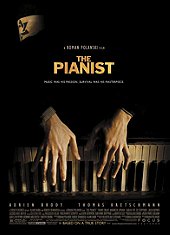The Holocaust is an exhaustively done subject matter in popular culture, one that by this point feels like there’s nothing left to discover or witness about the atrocities. The Pianist is interesting because it doesn’t present itself as a grand sweeping statement on the time period, but rather presents us with one man’s personal journey through the hell and quest for survival. It is admirably restrained, and deeply felt. It quietly hums with a personal pain and knowledge of first-hand experience.
Roman Polanski lived through the Holocaust, admitting that only his own death will purge the memories and pain of his mother going to the gas chamber. What he brings to The Pianist is a tremendous sense of detail and guttural emotion. The story is about Wladyslaw Szpillman, but parts of it could easily be Polanski’s own autobiography. That amount of empathy makes The Pianist truly special.
Through good luck and survivalist instincts, we watch Szpillman survive the Warsaw ghetto, escapes going to a concentration camp, smuggles in weapons for the failed uprising, and hiding out as Warsaw falls. Not only that, but Szpillman watches his entire family gets torn apart, only dodging the camps because of a friend on the Jewish Ghetto Police, and managing to survive the Uprising through the discovery of a kindly German officer. Szpillman’s story is the kind that not even a great novelist could invent.
The only problem I had with the film, and even then it wasn’t a huge one, was Adrian Brody’s lead performance. Gravitas and seriousness aren’t his strongest assets as an actor, he’s more alive when tasked with playing mischief like his cameo as Salvador Dali in Midnight in Paris. While he is disturbingly gaunt, depressive, and stoic, most of his big acting moments are undercut. The scene where he is discovered by Thomas Kretschmann’s good German and plays the piano for him puts the focus on Krestchmann instead of Brody. Here was a chance to see the various emotional undercurrents going on in Szpillman’s mind as he plays his beloved instrument for the first time in ages, but instead the focus is put on someone else. This does not mean that Brody’s work isn’t moving, on the contrary, it is frequently deeply felt and moving, rather that The Pianist makes his character a walking/talking symbol more often than not.
The Pianist does a great job showing us the changing morality, in which the narrative of Szpillman transformed from praying that the interference of outside forces will save the day to his personal choices to save himself at all costs. This impassive quality displays the randomness and chance involved in so many of the stories of survivors. Perhaps Polanski is even holding up his cinematic gifts as a mirror, refracting his lingering guilt over living while his mother died. Either way, The Pianist is a deeply felt and moving work.
 Login
Login